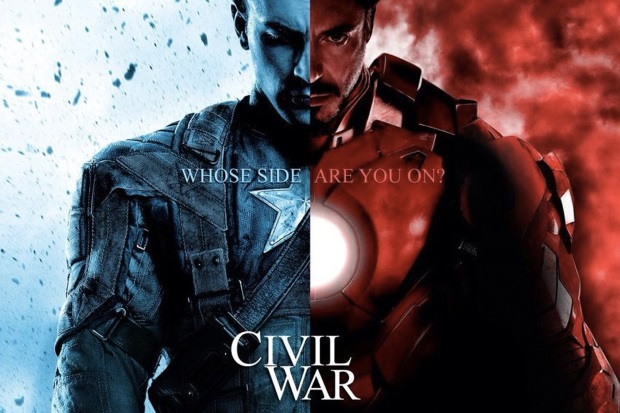Captain America: Civil War is the newest entry in Marvel’s serialized cinematic juggernaut, and it may be among the very best. Directors Anthony and James Russo revive the combination of kinetic action-comedy and character-driven suspense that made their previous entry, 2014’s Captain America: The Winter Soldier, the gold standard of the modern superhero genre. Judging by Civil War’s box office receipts, it needs no further introduction.
But Captain America: Civil War isn’t just popcorn fare for the summer movie crowd. The film pits Captain America and Tony Stark, the standard-bearers of the Marvel Cinematic Universe (MCU), against each other. In so doing, it wades into murkier moral territory than its ancestors, territory in which even our own audience loyalties become divided against themselves. (In my own screening, a theatre employee came in before the movie began to find out how many of us were “Team Cap” or “Team Tony.” Tony had it, I think, by a hair).
This is new ground for the MCU, but it’s all-too-familiar for the church. As the political climate in the United States becomes increasingly polarized, we see even our own churches and congregations desperately trying to figure out what it means to stay together. Civil War will likely still be in theatres as both the Presbyterian Church (USA) and the United Methodist Church meet this summer for their periodic national gatherings, each of them laced with the anticipation and residue of in-fighting and division. We know these waters too well.
Nonetheless, Civil War has some wisdom for us about our own institutional conflicts. So here are five things that Captain America: Civil War gets right about church conflict. Some spoilers ahead.
- Church conflict can have good principles on both sides. The basic conflict of Civil War — adapted loosely from a decade-old Marvel comic book series of the same name — revolves around a debate between Tony Stark/Iron Man and Steve Rogers/Captain America. Tony argues that the collateral damage caused by superhero activity necessitates government oversight. Cap worries about the corruptibility of those same civic agencies. One of the strengths of the film is that it treats both of these principles with respect, and, indeed, with empathy, a quality often in short supply as our churches take sides against themselves.
- Church conflict can be invisibly generational. Captain America was born in World War II-era comics, and, even in the films, he’s a World War II-era soldier frozen in ice and then reborn in 2011. Tony Stark began as a 1960’s moon-landing idealist; in the films, he finds common ground with the Elon Musk-era technocrats of Silicon Valley. Even though the two characters don’t seem to be vastly different in age, their grounding ideologies are worlds apart — a reminder that, as our congregations have been confronted by and adapted to modernity to different degrees, we emerge with conflict that can be fundamentally and surprisingly inter-generational.
- Even within good principles, church conflict can be uncomfortably personal. As Civil War progresses, the conflict between Tony and Cap moves from questions of intellectual principle to questions of personal animus. Tony argues for government oversight because he feels unbearable guilt for the innocent lives who have fallen on his watch. Cap resists because his super-powered good friend Bucky was under government oversight with disastrous results. As in our churches, a conflict about oppositional political philosophies unmasks itself over time to truly be a conflict about friendship, grief, and loss. What would it mean for us with frayed relationships across the aisle to acknowledge the personal cost and interpersonal loss involved in congregational and denominational strife?
(Bigger spoilers below, really!)
- Once the conflict starts, it’s really hard to get out. The climax of Civil War powerfully juxtaposes stories of vengeance and mercy. Tony discovers that Bucky is the one responsible — in body, if not in mind — for the murder of his parents, and his need for vengeance overwhelms him. On the other hand, on the edges of the scene, we find the Black Panther foregoing his own personal vendetta for his father’s death in favor of turning the guilty party over to the authorities. Because vengeance is cyclical, and because those feelings of guilt and hurt run deep, it’s hard to get out, even and especially for those long in the trenches of denominational warfare. In the end, the only way out is something like mercy.
- In church conflict, both sides share a common enemy. Tony and Cap have understandably conflicting principles, but that’s not why they fight. They fight because of the instigation of a common enemy who pulls the strings to set our heroes against each other. But of course our churches share an enemy, too, whether we call it decline, or fear, or, perhaps, in Paul’s language, death itself. It is no coincidence that Paul’s penultimate chapter to the warring Corinthian church reminds them so eloquently of the triumphant victory of the resurrection. Perhaps the first step in reconciling our own warring congregations is to likewise name and acknowledge our common foe.
This is a pretty superficial treatment, of course. There’s a lot more to be said. But if you’re thinking or even preaching about church conflict during this blockbuster season, maybe one of these thoughts will help get you started.

